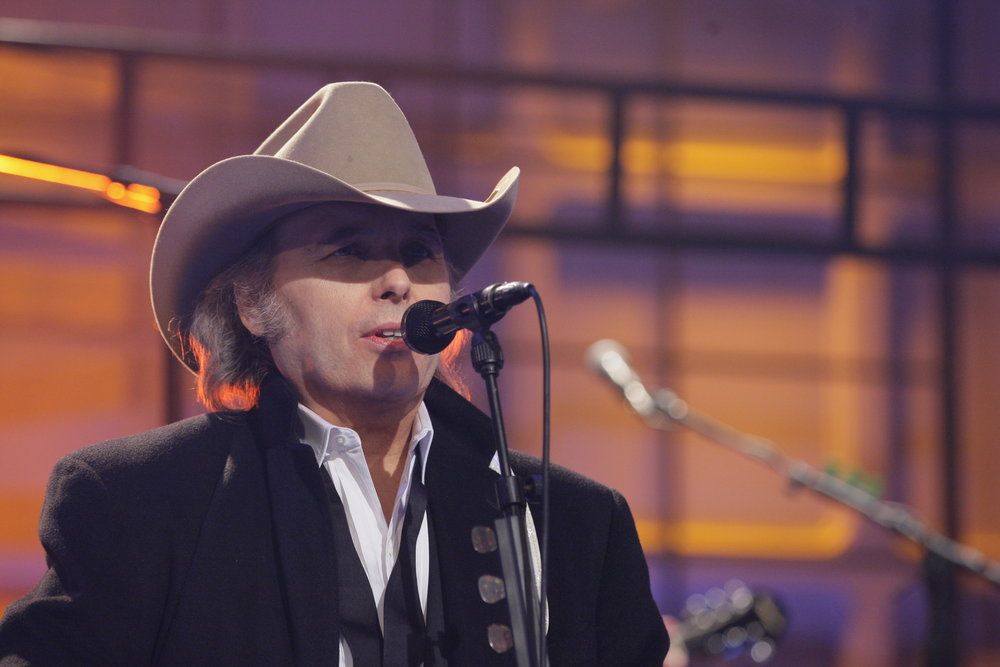
A barroom plea set to a bright shuffle—the sound of pride bending, not breaking.
Lay down the anchors first. “Please, Please Baby” is Dwight Yoakam in full stride: written by Yoakam, cut with producer Pete Anderson, and issued as the third single from Hillbilly Deluxe on November 2, 1987. It runs a lean 3:36, carries the Reprise 28174 stamp with “Throughout All Time” on the B-side, and it climbed to No. 6 on Billboard’s Hot Country Songs while going No. 2 in Canada. Years later, a live performance clip—drawn from Dwight Live—would become the familiar video version.
Now, step into the room the record builds. The drums don’t stomp; they walk—the patient two-step that lets a dance floor decide what kind of night it wants to have. A Telecaster snaps in the middle distance, steel flashes like chrome under neon, and Yoakam starts talking fast without ever sounding rushed. He isn’t bargaining so much as admitting—that complicated adult posture where you keep your dignity but still say, plain as day, I want you back. The title repeats like a small prayer with a backbeat. Older ears recognize that tone immediately: no grand speech, just the courage it takes to ask.
Part of the magic is how Anderson frames the feeling. The arrangement uses Bakersfield grammar—clean downstrokes, treble bright enough to catch the light, rhythm section breathing rather than bullying—but it’s not a retro costume. Every instrument earns its keep. The lead guitar answers Yoakam’s lines like an old friend who knows when to nod and when to hush. The steel colors the edges without turning the song into a sob story. There’s space in the mix, and that space tells you this isn’t drama for show; it’s grown-up longing that can stand the air around it.
Yoakam’s writing keeps the language human-sized: promises you can actually make, regrets you wouldn’t be embarrassed to confess. He never reaches for a metaphor to do the work of a plain sentence. That’s why the chorus lands so cleanly—three little words, please said twice, not because he’s weak but because he’s learned that asking can be stronger than pretending. The melody lifts and settles like a hand squeezing yours; by the second go-round you’re singing it without realizing you’ve climbed aboard.
The context matters, too. Hillbilly Deluxe had already proven he could hit with a cover (“Little Sister”) and a smoldering mid-tempo (“Little Ways”). Dropping “Please, Please Baby” in late ’87 felt like showing the third card in a winning hand: a pleading, high-energy single that still sounded like a band onstage rather than a studio machine. Radio answered with a Top-10 run in the U.S. and a near-miss at the top in Canada, the kind of split that tells you the record worked in honky-tonks and living rooms alike.
There’s a little tidy ledger behind the feeling, if you like sleeve notes. The 45 lists Reprise 28174, length 3:36, writer: Dwight Yoakam, producer: Pete Anderson, and a B-side—“Throughout All Time”—that would sit later on Side B of the LP. The official track sequence puts “Please, Please Baby” as Side A, track 4, where its spark can brighten the first half before the album’s shuffles and heel-kickers kick the doors wider. Those aren’t just catalog facts; they’re the fingerprints of a team that knew how to pace a record so a single could be a scene, not just a billboard.
What makes the performance last is posture. Yoakam sings right up on the mic, vowels rounded, consonants clipped, like a man trying not to spook the moment. He doesn’t dare the lover to come back; he invites her. That might sound small until you’ve lived long enough to know how rare it is. Plenty of breakup songs swagger or throw plates. This one holds the door and tells the truth. And because the band refuses to overplay, you feel the nerve it takes to be that open. Even the instrumental fills stay supportive—little bursts of confidence while the lyric walks into vulnerable ground.
If your first memory of the song is a video, that’s no accident. In the mid-’90s, a live performance clip directed by Bud Schaetzle (lifted from the Dwight Live era) gave the single a second face on television: Yoakam in the spotlight, band swinging hard, the crowd catching the hook like it had always been theirs. It fit the record perfectly, because this is a song built to breathe in front of people—no plot required, just the sound of a room deciding to give a man the benefit of the doubt for three and a half minutes.
Listen again and notice the small mercies that keep the track honest. The drummer resists the big fill where a lesser record would show off. The bass sits a hair behind the beat, giving the plea a tug of gravity. The harmony arrives like a friend backing you up—not a choir, just company. And when Yoakam hits that last title phrase, he doesn’t push it over the edge; he lets it ring, trusting the room to finish the sentence. That trust is the record’s secret motor. It’s what makes a 1987 single feel present-tense every time it spins.
For those of us who’ve learned to measure love by what we can carry rather than what we can promise, “Please, Please Baby” is a companion more than a performance. It doesn’t promise fireworks; it offers room—for apology, for hope, for the complicated kindness of wanting someone back without losing yourself to the wanting. That’s why the chart numbers are footnotes and the feeling is the headline. The band sets the table, the voice tells the truth, and the door stays open just long enough for two people to make a better decision than they made last time. That’s country music doing what it was built to do.